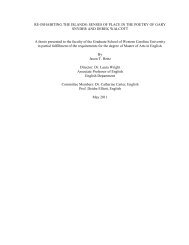SUMMERS, KAREN CRADY, Ph.D. Reading Incest - The University ...
SUMMERS, KAREN CRADY, Ph.D. Reading Incest - The University ...
SUMMERS, KAREN CRADY, Ph.D. Reading Incest - The University ...
You also want an ePaper? Increase the reach of your titles
YUMPU automatically turns print PDFs into web optimized ePapers that Google loves.
18<br />
Richard” (111). <strong>The</strong> dedication of the first version reads, in part, that this is “a bok for<br />
king Richardes sake” 3 , which is changed to “a bok for Engelondes sake / <strong>The</strong> yer<br />
sextenthe of kyng Richard [22 June 1392 to 21 June 1393]” (24-25). Nicholson finds the<br />
inclusion of the exact date significant because it might mean that the rewriting of the<br />
dedication was not because of any political dissatisfaction with Richard, as there would<br />
not have been time for any to develop. On the other hand, the date may simply have been<br />
added years later to “predate” the poem in order to make the dedication to Henry<br />
stronger. If so, this could indicate that “the rewriting might very well have been tied up<br />
with the political events at the end of the decade” (111). Despite this difference in the<br />
versions of the prologue, the individual books and especially the tales themselves are<br />
essentially the same, as is the narrative frame of the seven deadly sins which Gower uses<br />
to build his case.<br />
<strong>The</strong>re is in Confessio Amantis the element of instruction manual for kings; tale<br />
upon tale relates the destructive nature of poor kingship. However, the poet must<br />
prudently fictionalize his tales lest by speaking too directly, he insult the king. Relating<br />
stories of kings in antiquity is a way to camouflage direct criticism of one’s own king<br />
while still imparting wisdom. Ferster has demonstrated that like Gower, Chaucer crafted<br />
his narratives carefully to offer such advice while avoiding offense. In the Tale of<br />
Melibee, Chaucer removed a quote because “he knew the tale could have political<br />
reverberations and wanted to control them: He left out the proverb in his French source<br />
3 <strong>The</strong> first dedication in the Prologue was written by 1390; the revision was written c. 1392, which was the<br />
sixteenth century of Richard’s reign; Henry did not succeed to the throne until 1399. See Macaulay, Works<br />
of John Gower, (Oxford, 1901) for details on the revision. But having earlier composed Mirour de l’Omme<br />
and Vox Clamantis, by 1385 Gower was already a well-known poet. Furthermore, Chaucer’s dedication of<br />
Troilus and Cressida (c. 1385) must have added to Gower’s fame.
















